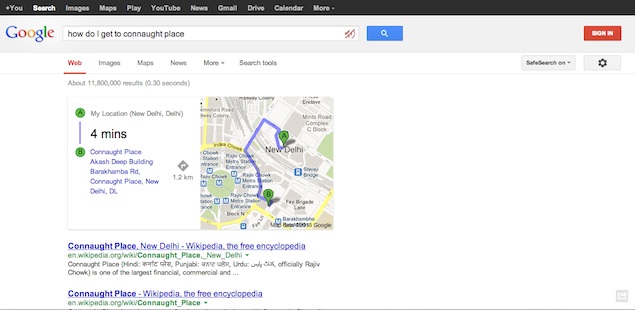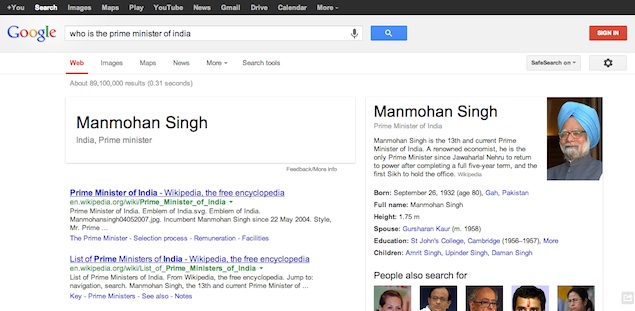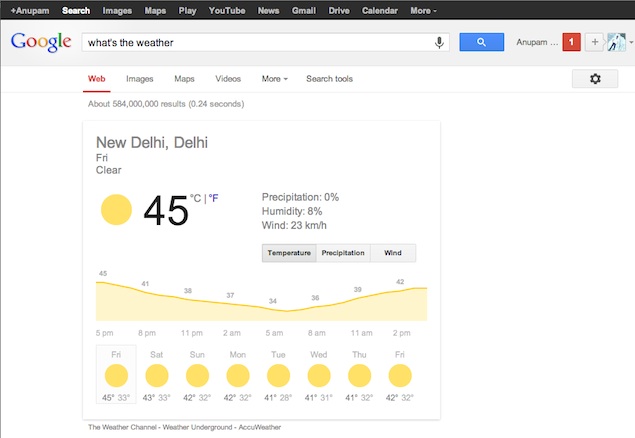- Home
- Internet
- Internet News
- Google's conversational search goes live on desktops via Chrome 27
Google's conversational search goes live on desktops via Chrome 27
By Anupam Saxena | Updated: 24 May 2013 17:41 IST

Click Here to Add Gadgets360 As A Trusted Source

Advertisement
Google has made the 'conversational search' feature that it demonstrated at its I/O Keynote, live on Chrome browser for Mac, Windows and Linux with the updated version (version 27) of the browser.
Similar to voice search and Google Now apps on Android and iOS devices, the new functionality allows users to ask Google questions by speaking with the search engine in a conversational manner using words and phrases, eliminating the need to key in search terms manually. The search engine also responds in a more natural, human-like way to create a feeling of personalisation.
Although Google's search bar has been featuring a microphone since it launched voice search in 2011, the same microphone now launches the conversational search and prompts the user to allow Google to use the microphone. After granting permission, you can ask a question and Google displays the results along with a voice answering the query.
 The service also displays Google Now-like cards at the top of search results when it uses a Google service. For instance, if you ask Google 'how do I get to Connaught Place', it returns a card with directions and commute time that can be expanded to see more details on Google Maps. The same happens when you ask about the weather conditions or a meaning of a word.
The service also displays Google Now-like cards at the top of search results when it uses a Google service. For instance, if you ask Google 'how do I get to Connaught Place', it returns a card with directions and commute time that can be expanded to see more details on Google Maps. The same happens when you ask about the weather conditions or a meaning of a word.
 If you're signed in with your Google credentials and use Google Calendar for events, it will even dig out events when you search for them.
If you're signed in with your Google credentials and use Google Calendar for events, it will even dig out events when you search for them.
However, Google has still not rolled out a totally hands-free experience and you can't switch to another search just by saying 'Ok Google' at the time of writing this post.
 If Search is not able to get back with a conversational reply, it just displays the search results based on the keywords comprehended by its speech to text engine.
If Search is not able to get back with a conversational reply, it just displays the search results based on the keywords comprehended by its speech to text engine.
We were able to get accurate results while using conversational with Google.co.in, however, location results were not that accurate as Google detects location via the Internet service provider.
With the implementation of conversational search, Google is now able to deliver a consistent voice search experience across mobile and desktop and offer a more personalised search experience.
Similar to voice search and Google Now apps on Android and iOS devices, the new functionality allows users to ask Google questions by speaking with the search engine in a conversational manner using words and phrases, eliminating the need to key in search terms manually. The search engine also responds in a more natural, human-like way to create a feeling of personalisation.
Although Google's search bar has been featuring a microphone since it launched voice search in 2011, the same microphone now launches the conversational search and prompts the user to allow Google to use the microphone. After granting permission, you can ask a question and Google displays the results along with a voice answering the query.
However, Google has still not rolled out a totally hands-free experience and you can't switch to another search just by saying 'Ok Google' at the time of writing this post.
We were able to get accurate results while using conversational with Google.co.in, however, location results were not that accurate as Google detects location via the Internet service provider.
With the implementation of conversational search, Google is now able to deliver a consistent voice search experience across mobile and desktop and offer a more personalised search experience.
Comments
Catch the latest from the Consumer Electronics Show on Gadgets 360, at our CES 2026 hub.
Related Stories
Popular on Gadgets
- Samsung Galaxy Unpacked 2025
- ChatGPT
- Redmi Note 14 Pro+
- iPhone 16
- Apple Vision Pro
- Oneplus 12
- OnePlus Nord CE 3 Lite 5G
- iPhone 13
- Xiaomi 14 Pro
- Oppo Find N3
- Tecno Spark Go (2023)
- Realme V30
- Best Phones Under 25000
- Samsung Galaxy S24 Series
- Cryptocurrency
- iQoo 12
- Samsung Galaxy S24 Ultra
- Giottus
- Samsung Galaxy Z Flip 5
- Apple 'Scary Fast'
- Housefull 5
- GoPro Hero 12 Black Review
- Invincible Season 2
- JioGlass
- HD Ready TV
- Laptop Under 50000
- Smartwatch Under 10000
- Latest Mobile Phones
- Compare Phones
Latest Gadgets
- Motorola Signature
- Vivo Y50e 5G
- Vivo Y50s 5G
- Realme 16 Pro+ 5G
- Realme 16 Pro 5G
- TCL Nxtpaper 70 Pro
- OPPO A6 Pro 5G
- Honor Power 2
- Lenovo Yoga Slim 7x (2025)
- Lenovo Yoga Slim 7a
- Realme Pad 3
- OPPO Pad Air 5
- Xiaomi Watch 5
- Huawei Watch 10th Anniversary Edition
- Acerpure Nitro Z Series 100-inch QLED TV
- Samsung 43 Inch LED Ultra HD (4K) Smart TV (UA43UE81AFULXL)
- Asus ROG Ally
- Nintendo Switch Lite
- Haier 1.6 Ton 5 Star Inverter Split AC (HSU19G-MZAID5BN-INV)
- Haier 1.6 Ton 5 Star Inverter Split AC (HSU19G-MZAIM5BN-INV)
© Copyright Red Pixels Ventures Limited 2026. All rights reserved.
















